Design-thinking workshop by the IFLA Sub-Saharan African Regional Division Committee, in Addis Ababa, Ethiopia
31 March 2022
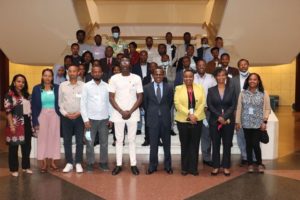 On the 7th and 8th March 2022, the IFLA Sub-Saharan African Regional Division Committee (IFLA SSA RDC) organised a design-thinking workshop to emerging library, information and knowledge management professionals on the Sustainable Development Goals (SDGs) and the Voluntary National Review (VNR) Process. This training was organised as a pre-conference workshop in the context of the 4th African Youth Sustainable Development Goals Summit, that took place in Addis Ababa, Ethiopia.
On the 7th and 8th March 2022, the IFLA Sub-Saharan African Regional Division Committee (IFLA SSA RDC) organised a design-thinking workshop to emerging library, information and knowledge management professionals on the Sustainable Development Goals (SDGs) and the Voluntary National Review (VNR) Process. This training was organised as a pre-conference workshop in the context of the 4th African Youth Sustainable Development Goals Summit, that took place in Addis Ababa, Ethiopia.
The workshop took place in Addis Ababa, Ethiopia and was co-organised by UN ECA Library, IFLA and Library Aid Africa.

The roles of libraries are changing globally due to the evolving nature of our society. This creates the need for improved approaches and techniques to make libraries viable in our competitive contemporary society. At the same time, libraries are also experiencing budget cuts and perceived redundancy due to other competitive options. This implies a need for libraries globally to re-access approaches and harness more proactive and innovative ways to ensure a brighter future. Importantly, there is a need to build the capacity of emerging library leaders with the prerequisite skills and knowledge to Lead the Future of libraries in Africa.
To achieve this, the UNECA Library, Library Aid Africa, and the International Federation of Library Associations and Institutions hosted a two-day pre-conference workshop at the 4th African Youth SDGs Summit, Addis-Ababa, Ethiopia. The two-day workshop trained 27 emerging library leaders across Ethiopia on Advocacy – 11 from regional government universities and 16 from libraries in the capital, and focused on advocating for libraries, Sustainable Development Plans & Voluntary National Reviews: Roles of libraries & librarians, and Design Thinking.
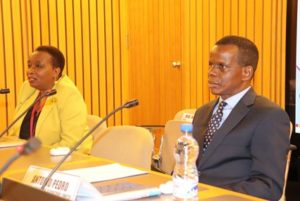
The opening session was facilitated by Ms. Irene Onyancha, Chief of the Knowledge Management Services Section at ECA, with a keynote address from Mr. Antono Pedro, ECA’s Deputy Executive Secretary, who officially opened the workshop. In his words, he stated that access to information is a catalyst to achieving the SDGs, and youths have an important role to play to achieve that.
In particular, the ECA Library played a crucial role in success of the workshop through the coordination and mobilization of resources, in particular the provision of a 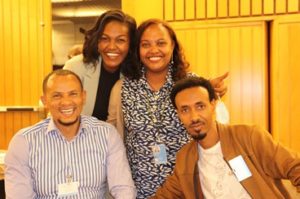 venue, financial sponsorship for workshop participants selected from all parts of Ethiopia, through developing and publishing a Research-Guide – 4th African Youth Sustainable Development Goals Summit – LibGuides at United Nations Economic Commission for Africa, and by setting up a digital exhibition to promote ECA knowledge products concerning the workshop thematic areas, active participation and coordination of the two days workshop. We are very grateful to them for their support.
venue, financial sponsorship for workshop participants selected from all parts of Ethiopia, through developing and publishing a Research-Guide – 4th African Youth Sustainable Development Goals Summit – LibGuides at United Nations Economic Commission for Africa, and by setting up a digital exhibition to promote ECA knowledge products concerning the workshop thematic areas, active participation and coordination of the two days workshop. We are very grateful to them for their support.
Advocacy
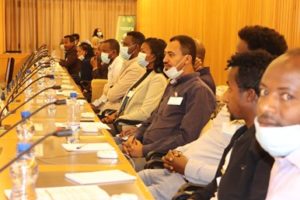 With libraries facing budget cuts and competition in terms of sources of access to information, it is imperative for emerging library leaders to learn what strategy and approaches they can use to understand the value and importance of library services and communicate that value and importance to the community, government leaders, and other decision-makers.
With libraries facing budget cuts and competition in terms of sources of access to information, it is imperative for emerging library leaders to learn what strategy and approaches they can use to understand the value and importance of library services and communicate that value and importance to the community, government leaders, and other decision-makers.
During the session on advocacy, participants were taught The Basics of Advocacy, who is an Advocate? Qualities of an Advocate, Developing an Advocacy Plan, Advocacy tools, and Stakeholder mapping.
Through active participation and peer group work, participants identified the following areas of advocacy for libraries in Ethiopia amongst others:
- Promotion of digital literacy for library users
- Awareness to the academic communities about library services
- Resources vs demand in the library
- The information gap on resources existing in the library and lack of experience on digitization
Sustainable Development Plans & Voluntary National Reviews: Roles of libraries & librarians
The achievement of the Sustainable Development Goals (SDGs) strongly depends on access to information, given that this is a transversal component to all the objectives.
As librarians, it is essential that we begin to explore the potential of information to contribute meaningfully and actively to sustainability plans through the impactful services we provide. Libraries can act as safe spaces for community innovation and co-creation, study and research, access to health information, information on job opportunities, skills development for youth, adult literacy services, and play many other potential library roles. We need to work to ensure that libraries are recognised as indispensable for progress and achievement of these global goals.
During a session focused on development plans and Voluntary National Reviews of SDG implementation, participants were taught about the SDGs and African Union 2063 Agenda, why are they important for libraries, and how libraries support their goals.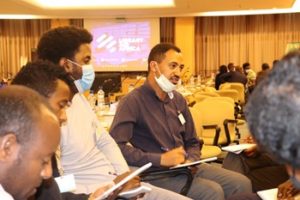
Moreover, participants also learnt about Voluntary National Reviews, why they are important for libraries? How can libraries prepare for and participate in the voluntary national review process?
Through active participation and grouping, participants identified key major areas to improve and drive progress for libraries towards achieving the SDGs: access and provide access to quality journals for users, progress towards universal literacy, offer inclusive services for users, and create a knowledge hub with educational institutions among others.
Design Thinking
We are facing a quickly changing and increasingly complex society in which people have many choices of services and products to solve their problems. This creates the need for library and information science professionals to explore human-centred approaches to co-create solutions that will underline the value-added of libraries in our competitive contemporary society. Design thinking is a way of exploring what we can do.
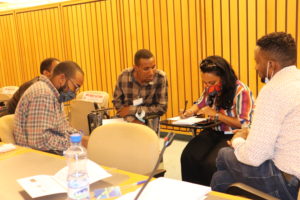 During a session on this topic, participants were grouped to think as a public/library user to identify a major problem and co-create a solution to address the problem identified. This gave the participants the chance to wear the cap of the library user/general public who wants the library to serve a particular need.
During a session on this topic, participants were grouped to think as a public/library user to identify a major problem and co-create a solution to address the problem identified. This gave the participants the chance to wear the cap of the library user/general public who wants the library to serve a particular need.
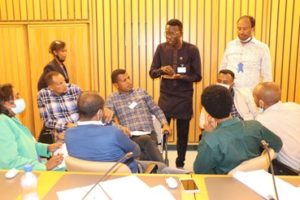 Through active participation, participants identified the following case scenarios: a case scenario of a single individual with a visual impairment, ICT and library-organized information literacy training, and open access to electronic journals.
Through active participation, participants identified the following case scenarios: a case scenario of a single individual with a visual impairment, ICT and library-organized information literacy training, and open access to electronic journals.
The scenarios above identified by the participants generated inclusive solutions the participants developed to address these challenges.
Presentation on ECA Institutional Repositories & Knowledge Portals
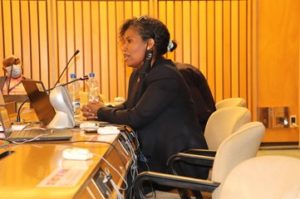 During the 2 day workshop, The UN ECA Library presented the ECA Institutional Repositories & Knowledge Portals. The presentation showcased information and knowledge portals created by the ECA Library to bridge the gap and provide equitable access to information about the UN, COVID-19, reports, resources and other intellectual properties needed for knowledge sharing and development.
During the 2 day workshop, The UN ECA Library presented the ECA Institutional Repositories & Knowledge Portals. The presentation showcased information and knowledge portals created by the ECA Library to bridge the gap and provide equitable access to information about the UN, COVID-19, reports, resources and other intellectual properties needed for knowledge sharing and development.
Experience Sharing in SDGs and Advocacy & Closing Remarks
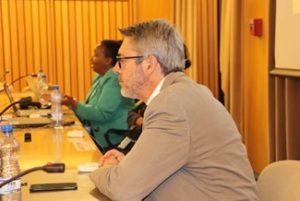 The workshop ended with conclusions and experience sharing from Ms. Irene Onyancha, Chief of the Knowledge Management Services Section at ECA and Francesco Pisano Director of Library & Archives at United Nations Geneva.
The workshop ended with conclusions and experience sharing from Ms. Irene Onyancha, Chief of the Knowledge Management Services Section at ECA and Francesco Pisano Director of Library & Archives at United Nations Geneva.
Ms. Onyancha shared her experience on harnessing digital technology to revamp the state of library and knowledge management in the ECA. During this she highlighted her career journey as a librarian, lessons, progress and guidance for emerging library leaders.
Visit to Grand and State of the Art Aberhot Public Library
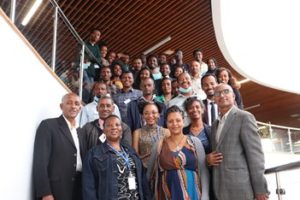 The ECA Library mobilized workshop participants to The Grand and State of the Art Aberhot Public Library. During the visit participants were able to learn about the library’s unique architecture, design and facilities. More importantly, how the library is positioned to serve as the knowledge hub for existing and potential library library users.
The ECA Library mobilized workshop participants to The Grand and State of the Art Aberhot Public Library. During the visit participants were able to learn about the library’s unique architecture, design and facilities. More importantly, how the library is positioned to serve as the knowledge hub for existing and potential library library users.
Conclusion
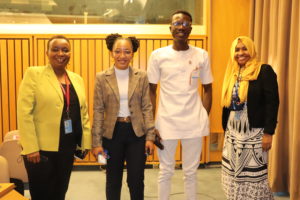 As our society evolves, there is an increasing need to re-access the library’s role to suit the needs of a contemporary user. To achieve this, it is imperative to harness knowledge audit, capacity development, learning, re-learning and unlearning. We must continuously develop the capacity of emerging library leaders with the skills and capacity needed to thrive and make libraries successful into the future.
As our society evolves, there is an increasing need to re-access the library’s role to suit the needs of a contemporary user. To achieve this, it is imperative to harness knowledge audit, capacity development, learning, re-learning and unlearning. We must continuously develop the capacity of emerging library leaders with the skills and capacity needed to thrive and make libraries successful into the future.
The 2 days pre-conference workshop set the pace for the next generation of library leaders who will shape the future of libraries forward in Ethiopia.